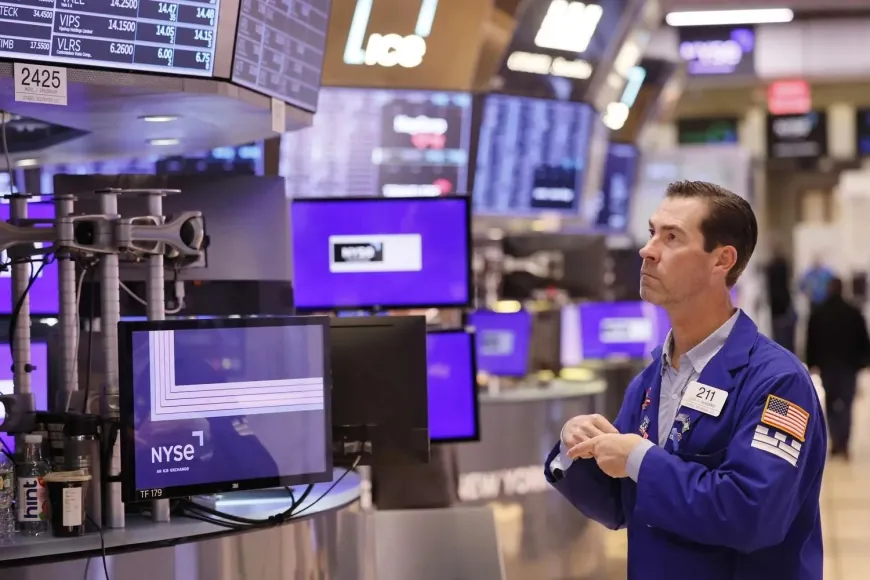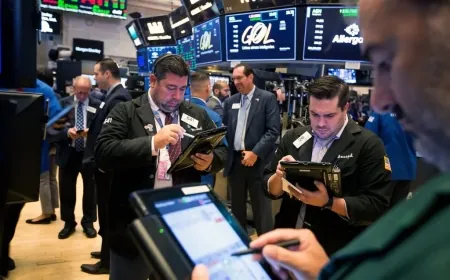Stock Market Live: Tesla Falls, Dow and Nasdaq Slip as Senate Acts on Tax Plan and AI Law
Live coverage: US stocks ease after highs. Tesla drops, tax bill moves in Senate, Fed watch continues. Follow real-time updates and key market moves.

U.S. stock indexes dipped slightly on Tuesday as recent momentum paused and traders shifted focus to ongoing political discussions and upcoming economic updates.
After hitting fresh highs on Monday, the S&P 500 saw a mild drop of 0.3%. The Dow Jones also slipped by 0.2%, while the Nasdaq fell 0.4%, largely dragged down by a sharp drop in Tesla shares. The electric vehicle maker faced renewed pressure as its CEO, Elon Musk, found himself in the spotlight again over tensions with former President Donald Trump.
In Washington, lawmakers continued work on a major tax and spending proposal backed by Trump. With the July 4 target date approaching, discussions extended into the early hours of Tuesday as final changes were debated in the Senate. Among the amendments gaining traction is a proposal that would allow individual states to create their own rules on artificial intelligence — a move that may impact major tech firms.
Also Read: Dow Surges, Nasdaq Hits New High as Tax Bill Pushes Forward & Tariff Threats Cool
Trade talks also remain on the agenda. With limited time before a key July 9 deadline, U.S. officials are now exploring smaller trade arrangements instead of broader agreements. The goal is to avoid a new round of tariffs, which could disrupt international partnerships.
Elsewhere, markets are watching for signals from the Federal Reserve. Chair Jerome Powell is expected to speak later today at a global economic event. His remarks could offer hints on the future of interest rates, especially after recent calls for a large rate reduction. Investors are hoping for signs that the Fed may act sooner if the economy shows signs of strain.
On the economic front, this week’s focus turns to the job market. Tuesday began with new data on job openings, and attention is now on Thursday’s employment report for June. A weaker labor market could increase the chances of a rate cut, making these numbers especially important for investors.
|
Follow iShook on Social Media for More Tips and Updates! |
Stay tuned for live updates throughout the day.
Key Moments
- US stock indexes edge lower after hitting record highs Monday.
- Tesla shares slide amid renewed tensions between Musk and Trump.
- Senate passes amendment lifting the ban on state AI regulation.
- Trump’s sweeping tax and spending bill advances toward July 4 deadline.
- Markets await Fed Chair Powell’s speech for rate cut signals.
-
6 Questions US Investors Are Asking as the Second Half of 2025 Begins
After a volatile first half marked by Trump’s tariff policies and renewed Fed rate cut speculation, the S&P 500 has posted a 5% year-to-date gain. As trading picks up in July, investors are entering the second half of 2025 with fresh concerns and expectations.
Here are six key questions shaping market sentiment now:
- Will the Fed deliver a major rate cut amid slowing data?
- Are more tariffs coming as Trump pushes his trade agenda?
- Can corporate earnings support current market valuations?
- How will the Musk–Trump conflict impact Tesla and tech stocks?
- Is inflation cooling fast enough to shift the Fed’s stance?
- Could election risks or global tensions disrupt momentum?
-
How Boeing, Walmart, and Tesla Reflect the Market Story of 2025
The first half of 2025 can be summed up through the lens of three major stocks — each representing a core theme driving markets this year.
Boeing (BA) has become a symbol of government-backed resilience, frequently tied to trade discussions and seen as benefiting from Washington’s strategic positioning.
Walmart (WMT), meanwhile, highlights the downside of tariff pressures. The retail giant has flagged rising costs and held back on full-year guidance, signaling uncertainty in consumer pricing and demand.
Tesla (TSLA) continues to be a story of volatility — both from market swings and the ongoing spotlight on Elon Musk, whose ties to political shifts and public statements have added to the unpredictability.
Together, these companies tell the broader story of a market navigating political influence, policy changes, and shifting investor sentiment in 2025.
-
Senate Drops AI Ban Clause as Trump’s Megabill Faces Delays
Senate Republicans have dropped a controversial measure that would’ve blocked states from setting their own AI regulations for the next decade — a key concession as President Trump’s massive budget and tax bill struggles to advance.
The AI provision, backed by many in Silicon Valley, was pulled during a late-night session after Sen. Marsha Blackburn (R-TN) reversed her support for a compromise deal. The move undercut what had been one of the more tech-friendly parts of the bill.
AI-related stocks like Nvidia (NVDA) slipped in early trading following the news, while broader tech shares remained mostly flat ahead of the open.
With time running short before Trump’s July 4 deadline, the bill faces new uncertainty in the Senate.
-
10-Year Treasury Yield Falls to 2-Month Low Ahead of Powell Speech
The 10-year Treasury yield dropped to 4.20% on Tuesday — its lowest level since early May — as investors look ahead to Federal Reserve Chair Jerome Powell’s appearance at a major central banking event in Portugal.
Powell will speak later today at the European Central Bank’s annual forum in Sintra, where he’s expected to weigh in on interest rate policy. His remarks come just as political pressure ramps up, with former President Trump reportedly sending him a signed message urging aggressive rate cuts.
With Wall Street increasingly betting on a possible rate cut in the coming months, Powell’s tone today could help shape market expectations.
Stay tuned for live updates from his appearance.
-
Tesla Shares Drop as Trump Threatens to Slash Subsidies for Musk’s Businesses
Tesla stock fell by as much as 6% before Tuesday’s market open, following renewed tensions between CEO Elon Musk and President Trump. Trump reignited his attacks, threatening to cut government subsidies not only for Tesla but also for Musk’s other ventures, including SpaceX.
On his social media platform, Truth Social, Trump claimed Musk receives more subsidies than anyone else in history and suggested that without them, Musk might have to shut down his operations and return to South Africa. He also warned that halting rocket launches, satellite projects, and electric car production could save the country a significant amount of money.
The latest dispute comes after Musk criticized Trump’s expansive tax and spending bill, which recently passed a Senate vote. The bill now includes last-minute changes that would phase out electric vehicle tax credits sooner than planned, potentially affecting Tesla buyers, and adds roughly $1 trillion to the overall cost.
-
US Stocks Slide After Hitting Records as Senate Moves Trump’s Budget Bill Forward
US stocks fell Tuesday morning after reaching record highs the day before. Investors are closely watching President Trump’s big budget bill as it moves through the Senate and waiting for updates on trade talks ahead of the July 9 deadline.
The S&P 500 dropped about 0.3%, slipping back after climbing above 6,200 on Monday. The Dow Jones stayed mostly steady, showing little change.
Tech stocks led the decline, with Tesla shares plunging over 7% amid renewed tensions between Elon Musk and Trump. Nvidia dropped 1%, and Meta dipped slightly after both hit record highs recently.
With political and trade issues still unresolved, investors remain cautious about the market’s next moves.





































































